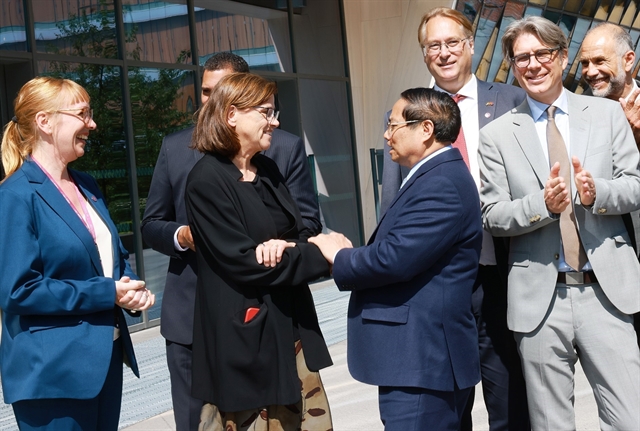 Politics & Law
Politics & Law

 |
| Prime Minister Phạm Minh Chính visits the Karolinska Institutet. — VNA/VNS Photo Dương Giang |
STOCKHOLM — Vietnamese Prime Minister Phạm Minh Chính on Friday visited and held a working session with leaders of the Karolinska Institutet (KI), one of the world’s foremost medical universities and the most renowned centre for medical training and research in Sweden.
Founded in 1810, the institute trains about 7,000 students and over 2,000 doctoral candidates annually across its two campuses. Renowned for selecting Nobel laureates in physiology or medicine – two of its own scientists have received the prestigious award, the institute has long been a beacon of biomedical innovation, with faculty and alumni shaping modern medical science.
In Việt Nam, the KI has carried out cooperative activities with the Hà Nội Medical University (HMU), the National Children’s Hospital (NCH), and the Việt Nam – Sweden Uông Bí Hospital. Collaborative projects with these units and others, including the Hà Nội Obstetrics and Gynecology Hospital, have bolstered Việt Nam’s research capacity, doctoral training, health policy development, and adoption of advanced medical technologies.
The institute's leaders expressed enthusiasm for expanding partnerships with Việt Nam, particularly in tackling pressing healthcare challenges such as neonatal mortality and care for premature infants, and combining cutting-edge clinical research with private sector involvement. They noted that Vietnamese students joining these programmes would also be eligible for doctoral degrees.
PM Chính praised the KI's global academic stature and its contributions to Việt Nam’s healthcare system, which date back over 55 years to the nation’s wartime struggles.
He expressed gratitude to the Swedish Government and people for their enduring support, including the establishment of key establishments like the NCH and the Việt Nam – Sweden Uông Bí Hospital, which remain vital pillars of Việt Nam’s healthcare infrastructure.
The PM further underscored Sweden’s role in building a sustainable healthcare system in Việt Nam through effective medical training, expertise sharing, and academic exchanges, with the KI's programmes playing a prominent and impactful role.
Việt Nam plans to create breakthroughs in science and technology, innovation, and digital transformation, particularly in healthcare, PM Chính said, noting that the country is also accelerating the development of smart hospitals and digitising patient records as part of this effort.
Việt Nam is transitioning its healthcare strategy from treatment-centred services to a more holistic model that emphasises disease prevention and health promotion, while also shifting from population control to fostering population development, he stated.
The Government leader revealed that during his trip, Việt Nam and Sweden established a sectoral strategic partnership in science, technology, innovation, and digital transformation.
Against this backdrop and based on shared values and mutual understanding, PM Chính suggested the KI continue to partner with Việt Nam in the area of healthcare, thus producing concrete outcomes.
The PM called for closer, broader, and more effective cooperation with Vietnamese partners, guided by the principles of mutual benefit, joint efforts, shared outcomes, and common development, including promoting stronger public-private partnerships and collaboration with businesses.
He highlighted key areas that should be focused, including training high-quality human resources through both long-term and short-term programmes; organising internships, student and expert exchanges, and joint academic forums; promoting medical research cooperation; transferring new technologies in biomedical science and pharmaceutical and vaccine production; and expanding partnership between Karolinska Institute and big hospitals in Việt Nam in clinical treatment and research, and healthcare system development.
The Vietnamese Government is committed to creating the best possible conditions to expand cooperation programmes with the KI within both bilateral and multilateral frameworks, he added. — VNS




